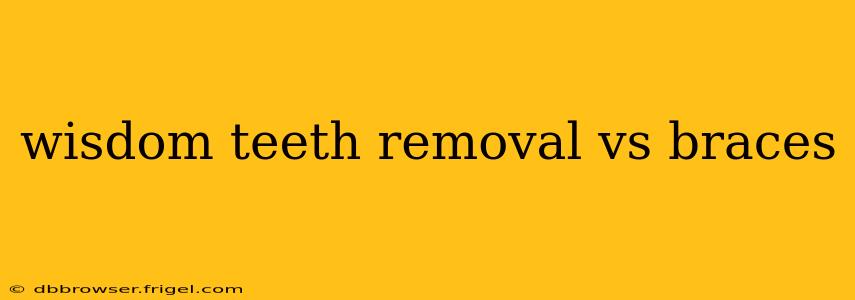Wisdom Teeth Removal vs. Braces: Which Comes First? A Comprehensive Guide
The decision of whether to get wisdom teeth removed or braces first is a common dental dilemma. Both procedures significantly impact your oral health and can influence the timing and success of the other. This guide will explore the complexities of this choice, helping you understand the factors to consider when making this crucial decision.
Understanding the Procedures:
Before delving into the order of procedures, let's briefly review wisdom teeth removal and orthodontic treatment (braces).
-
Wisdom Teeth Removal: This involves surgically extracting the third molars, also known as wisdom teeth. These teeth often emerge impacted (partially or fully trapped under the gum line), causing pain, infection, or damage to adjacent teeth.
-
Braces (Orthodontic Treatment): Braces are used to straighten teeth and improve the overall alignment of your bite. This improves aesthetics and can also prevent or correct various dental and jaw problems.
Should I Get My Wisdom Teeth Removed Before or After Braces?
The ideal sequence depends heavily on individual circumstances. There's no universally correct answer, and a consultation with an orthodontist and oral surgeon is crucial for personalized advice.
Factors Influencing the Decision:
Several factors influence whether wisdom teeth removal precedes or follows orthodontic treatment:
-
Impacted Wisdom Teeth: If your wisdom teeth are impacted and causing problems (pain, infection, cysts), removal is often prioritized, regardless of whether you're planning braces. Leaving impacted teeth can complicate orthodontic treatment and potentially necessitate further surgical interventions.
-
Space for Wisdom Teeth: If there's sufficient space for wisdom teeth to erupt without causing crowding or damaging other teeth, the orthodontist might recommend braces first. The braces can then create space for the wisdom teeth, although this is less common.
-
Timing of Orthodontic Treatment: If braces are planned for a younger patient, the orthodontist might prefer to wait until the wisdom teeth have either erupted or are fully developed before initiating treatment. This allows for better assessment and planning.
-
Potential for Complications: Removing wisdom teeth before braces can simplify the orthodontic process, minimizing the risk of complications related to impacted teeth. Conversely, removing wisdom teeth after braces can be more challenging due to the altered tooth positions.
Frequently Asked Questions (Addressing People Also Ask):
1. Can I get braces if I have impacted wisdom teeth?
Yes, you can get braces even if you have impacted wisdom teeth. However, your orthodontist will likely assess the situation and possibly recommend wisdom teeth removal before, during, or after your braces treatment depending on the severity of the impaction and its potential influence on the success of orthodontic treatment.
2. Will wisdom teeth affect my braces?
Impacted wisdom teeth can indeed affect your braces treatment. They can push against your other teeth, disrupting the alignment achieved with braces. They can also cause difficulties during the process, potentially impacting the duration and overall success of your treatment.
3. Does removing wisdom teeth affect orthodontic treatment?
While wisdom teeth removal doesn't directly influence the mechanics of braces, the recovery period might slightly disrupt the timeline. Also, the removal can alleviate pressure or crowding issues that would otherwise complicate the orthodontic process, potentially leading to a shorter treatment time.
4. What are the risks of getting wisdom teeth removed before braces?
The risks are generally minimal with modern surgical techniques. However, potential risks include infection, dry socket (painful complication), nerve damage (rare), and swelling. Your oral surgeon will discuss these risks thoroughly during your consultation.
5. What are the risks of getting wisdom teeth removed after braces?
Removing wisdom teeth after braces might be more challenging surgically, requiring more extensive procedures. The risk of damaging the newly straightened teeth is also higher.
Conclusion:
The decision of whether wisdom teeth removal should precede or follow orthodontic treatment requires a careful assessment by both an orthodontist and an oral surgeon. They'll consider your individual circumstances, including the position and development of your wisdom teeth, your overall oral health, and your orthodontic goals. Scheduling consultations with both specialists is crucial for personalized advice and a successful outcome. Don't hesitate to ask questions and thoroughly understand the treatment plan before proceeding.
